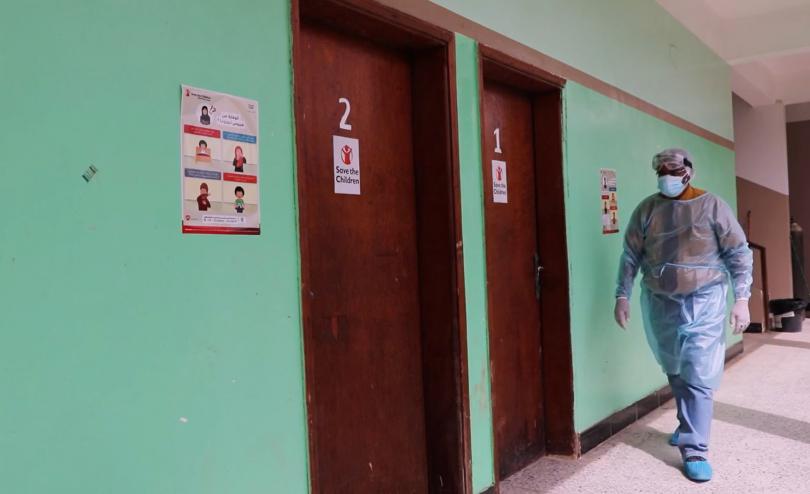Yemen: Thousands of children’s lives at risk as healthcare services plummet

Healthcare for children in war-torn Yemen has been further devastated by a combination of funding cuts and the impact of the COVID-19 pandemic, Save the Children has warned.
Between January and April of this year, the number of people accessing child health care services plummeted by 81 percent, according to recent data. Some remaining healthcare resources are now focused on providing COVID-19 services, families cannot afford to travel to access medical care or are afraid to visit health facilities in the midst of the rapidly expanding coronavirus outbreak.
With hospitals and health facilities also facing critical shortages of doctors and nurses, the agency says this threatens to leave thousands of children without the medical attention they need to survive.
These are shattering blows at a time when Yemen needs support more than ever. Its population is caught up in a lethal combination of violence, disease and hunger.
Xavier Joubert, Country Director for Save the Children in Yemen said:
“People are turning up with their children at health facilities only to find there’s not enough resources to help everyone, not to mention the shortage of PPE which prevents doctors and other staff from working.
“For over five years, millions of children have been battling for their survival every day. Now we have seen a shocking reduction of 80% in the use of healthcare services for children since the beginning of the year. While healthcare is suffering across the board children are being hardest hit, endangering thousands who need support on a daily basis. The world is standing by, and even reducing funding, while children are dying.”
Salem*, 45 from Saada, is a father of six. His youngest child is nine months old and is severely acutely malnourished. He said:
“We are afraid to go to the hospital because of the virus that is killing people but when we see the threat of death in the eyes of our sick child, we have no choice but to risk it and take him to the hospital, borrowing money just to pay the taxi fees that we can’t afford.
“Many families isolate themselves from the coronavirus but what is the point if children are being killed inside their home by air strikes or die because of lack of transportation.”
Five years of war had already pushed the health sector in Yemen to the brink, with only half of the healthcare facilities in the country operational even before the pandemic. With existing services now functioning as COVID-19 treatment centres, child healthcare services are increasingly sidelined.
Save the Children’s Child Protection officer in Saada, Mahmud*, said:
“Last week, we tried to provide support to an 11-year-old boy who suffered from a head injury after an airstrike hit his house. The family drove for four hours to reach the hospital. The first two days he was able to get some treatment but unfortunately due to the increased admission of COVID-19 patients in the hospital and the severe lack of resources, the child passed away on the third day”.
Less than half of the $627 million needed for 2020 health response in Yemen has been funded, compromising life-saving work. Since January, Save the Children saw a gradual decrease of access to its own health services for children, with a dramatic deterioration from May onwards. A monthly average of 450 people per clinic could not be treated, including an estimated 207 children suffering from preventable diseases like dengue fever and cholera – both of which can be deadly without treatment.
At the same time, the number of malnourished children under five is estimated to reach 2.4 million by the end of this year. Water and sanitation services vital to the health of Yemen’s children are also critically underfunded and could be forced to close.
Joubert continued: “Some of the clinics we support had to scale back capacity, also for nutrition services, and we are already seeing the impact on children. In Lahj and Hajjah, malnutrition rates have reached 11% and our teams are struggling to continue providing nutrition services. It’s time for all of us to face the harsh reality that we might witness thousands of children dying over the next months, if support remains limited.”
“Instead of fighting, all parties involved should adhere to the call for a ceasefire to focus on mitigating the COVID-19 outbreak in Yemen, and the impacts it has on children. I hope this wake-up call will not come too late and that donors will make additional commitments, so we can continue to provide assistance to the children of Yemen.”
*Names changed to protect identity
To support Save the Children’s global COVID-19 emergency appeal, click here.
Notes to Editors
- Recent Health Cluster data given to humanitarian agencies revealed an 81% drop in child health services in Yemen from January to April 2020.
- The acute funding shortages in Yemen are also impacting access to water and soap, essentials of Covid19 prevention. Starting from July, water, sanitation and hygiene (WASH) services for 6 million people, including 3 million children, could close and water supply will be forced to stop in parts of the country.
- According to UNICEF, due to the shortfalls in humanitarian aid funding and COVID19, an additional 30,000 Yemeni children could develop life-threatening severe acute malnutrition over the next six months, and the overall number of malnourished children under the age of five could increase to a total of 2.4 million –almost half of all under-fives in the country and a rise of around 20 per cent.
- Yemen is in the midst of a cholera outbreak that has seen 378,052 cases recorded from 1 January 2018 to 14 June 2020, including more than 3,000 in the week from 8 – 14 June 2020.
- Multimedia content is available from one of a clinic that is supported by Save the Children here.
For interview requests or questions, feel free to reach out:
Anna Pantelia, anna.pantelia@savethechildren.org / +30 694 568 9048
Rik Goverde, rik.goverde@savethechildren.org / +44 (0) 7732 602 301
Out-of-hours: Media@savethechildren.org.uk +44 7831 650 409




